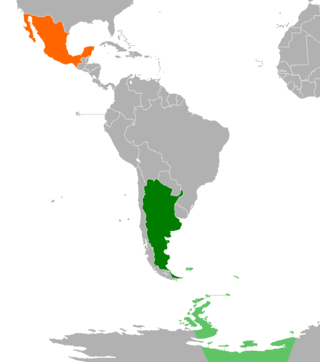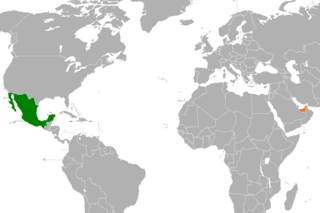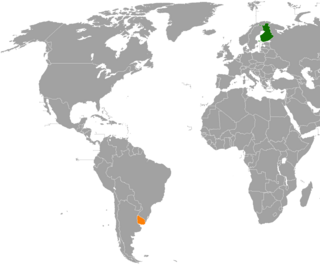
The nations Mexico and Russia initially established diplomatic relations in 1890. In 1924, Mexico recognized and established diplomatic relations with the Soviet Union. In 1930, Mexico broke diplomatic relations with the USSR and granted asylum to Leon Trotsky. In 1943, Mexico and the USSR re-established diplomatic relations. After the dissolution of the union, Mexico once again established diplomatic relations with the current Russian Federation in 1992.

The nations of Chile and Mexico established diplomatic relations in 1831, however, relations were severed in 1974 in the aftermath of the 1973 Chilean coup d'état. Diplomatic relations were re-established in 1990 and have continued unabated since.

The nations of Argentina and Mexico established diplomatic relations in 1888. Both nations are members of the Community of Latin American and Caribbean States, G-20 major economies, Latin American Integration Association, Organization of American States, Organization of Ibero-American States and the United Nations.

Italy–Uruguay relations are the current and historical relations between Italy and Uruguay. Both nations enjoy friendly relations, the importance of which centers on the history of Italian migration to Uruguay. Approximately 40% of the Uruguayan population is of Italian origin. Both nations are members of the United Nations.

France–Uruguay relations are the current and historical relations between the French Republic and the Oriental Republic of Uruguay. Both nations enjoy friendly relations, the importance of which centers on the history of French migration to Uruguay. In the late 19th century, one-third of Uruguay's population was of French descent. Both nations are members of the United Nations.

Japan–Uruguay relations are foreign relations between Japan and Uruguay. Both countries are members of the United Nations and the World Trade Organization.

Mexico–India relations, also called Mexican-Indian relations or Indo-Mexican relations, are the diplomatic relations between India and Mexico. Both nations are members of the G-20 major economies and the United Nations.

Denmark–Mexico relations are the foreign relations between Denmark and Mexico. Both nations are members of the Organisation for Economic Co-operation and Development and the United Nations.

The nations of Mexico and Venezuela established diplomatic relations in 1831, however, diplomatic relations between both nations have been historically unstable on several occasions. During the Venezuelan presidential crisis, Mexico took a neutral position and has continued to maintain diplomatic relations with the government of President Nicolás Maduro.

The nations of Mexico and Peru established diplomatic relations in 1823. Diplomatic relations were briefly cut in 1932 and reinstated again in 1933. Both nations are members of the Asia-Pacific Economic Cooperation, Community of Latin American and Caribbean States, Lima Group, Organization of Ibero-American States, Organization of American States, Pacific Alliance and the United Nations.

Cuba–Uruguay relations refers to the diplomatic relations between the Republic of Cuba and the Oriental Republic of Uruguay. Both nations are members of the Community of Latin American and Caribbean States, Group of 77, Organization of Ibero-American States and the United Nations.

Costa Rica–Uruguay relations refers to the diplomatic relations between Costa Rica and Uruguay. Both nations are members of the Community of Latin American and Caribbean States, Group of 77, Organization of American States, Organization of Ibero-American States and the United Nations.

El Salvador–Uruguay relations refers to the diplomatic relations between the Republic of El Salvador and the Oriental Republic of Uruguay. Both nations are members of the Community of Latin American and Caribbean States, Group of 77, Organization of American States, Organization of Ibero-American States and the United Nations.

Portugal–Uruguay relations refers to the current and historical relations between Portugal and Uruguay. Both nations are members of the Organization of Ibero-American States and the United Nations.

The nations of Honduras and Mexico established diplomatic relations in 1879. Both nations are members of the Association of Caribbean States, Community of Latin American and Caribbean States, Organization of American States, Organization of Ibero-American States and the United Nations.

Mexico–Saudi Arabia relations are the diplomatic relations between Mexico and Saudi Arabia. Both nations are mutual members of the G-20 major economies and the United Nations.

Mexico–United Arab Emirates relations are the diplomatic relations between Mexico and the United Arab Emirates. Both nations are members of the United Nations.

Mexico–Qatar relations are the foreign relations between Mexico and Qatar. Both nations are members of the United Nations.

Diplomatic relations exist between Azerbaijan and Uruguay. Neither country has a resident ambassador.

Finland–Uruguay relations are the bilateral relations between Finland and Uruguay. Both nations are members of the United Nations.

























